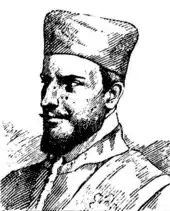Ercole amante
Ercole amante (Hercules in Love, French: Hercule amoureux) is an opera in a prologue and five acts by Francesco Cavalli. Its Italian libretto is by Francesco Buti, based on Sophocles' The Trachiniae and on the ninth book of Ovid's Metamorphoses. The first performance took place on 7 February 1662 in the Salle des Machines of the Tuileries in Paris.

Background
Cardinal Mazarin commissioned the opera to celebrate the June 1660 wedding of Louis XIV and Maria Theresa of Spain, but preparations for the staging were on a grand scale and caused a twenty-month delay, irritating the composer. Worse for him, eighteen ballet entrées and intermèdes with music by Isaac de Benserade and Jean-Baptiste Lully were inserted, mostly at the ends of Cavalli's acts, to cater to French taste. These were not merely diversions but also served to further the plot,[1] and in the event they met with greater approval from the audience than Ercole amante itself, helping boost Lully's position at the French court.
Performance history
After its premiere the opera was given another seven times: 14 and 18 February; 18, 22, 25, and 29 April; and 6 May. The theatre was built specifically to present the opera, and if the construction costs of the theatre are included, it was the most expensive of the French court's theatrical productions mounted up to that point.[2]
Roles
| Role | Voice type | Premiere cast, 7 February 1662[3] |
|---|---|---|
| Cinzia, prologue | soprano castrato | Giuseppe Meloni |
| Ercole | bass | Vincenzo Piccini |
| Deianira, Ercole's wife | soprano | Leonora Ballarini |
| Hyllo, son of Ercole | tenor | Giuseppe Agostino Poncelli |
| Iole | soprano | Anna Bergerotti |
| La bellezza | soprano | Anne de La Barre |
| Giunone | soprano castrato (en travesti) | Antonio Rivani |
| Mercurio | tenor | Signor Tagliavacca |
| Nettuno | bass | Paolo Bordigone[4] |
| Venere | soprano | Hylaire Dupuis |
| Tevere | bass | Signor Beauchamps |
| Shade of Eutyro | bass | Paolo Bordigone |
| Licco | contralto castrato | Giuseppe Chiarini |
| Shade of King Laomedonte | tenor | Signor Vulpio |
| Shade of Bussiride | contralto castrato | Signor Zanetto |
| Shade of Queen Clerica | soprano | Anne de La Barre |
| Pasithea | soprano | Signora Bordoni |
| Sonno | silent actor | |
| Paggio | soprano | |
References
Notes
- Clinkscale 1992; Coeyman 1998, p. 55
- Coeyman 1998, p. 55.
- Casaglia, Gherardo (2005)."Ercole amante, 7 February 1662". L'Almanacco di Gherardo Casaglia (in Italian).
- An alternative spelling is Bordigoni, according to the Großes Sängerlexikon.
Sources
- Clinkscale, Martha Novak (1992). "Ercole amante". In Stanley Sadie (ed.). The New Grove Dictionary of Opera. London. ISBN 0-333-73432-7.
- Coeyman, Barbara (1998). "Opera and Ballet in Seventeenth-Century French Theatres: Case Studies of the Salle des Machines and the Palais Royal Theater". In Radice, Mark A. (ed.). Opera in Context: Essays on Historical Staging from the Late Renaissance to the Time of Puccini. Portland, Oregon: Amadeus Press. pp. 37–71. ISBN 9781574670325.
External links
- L'Ercole: Scores at the International Music Score Library Project